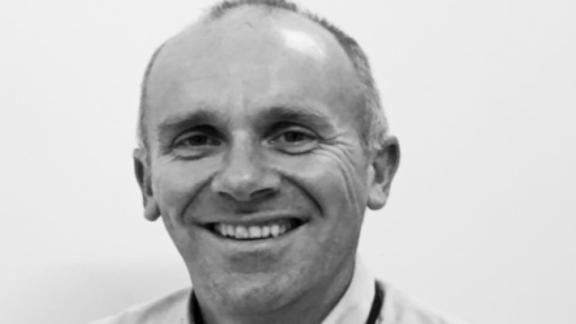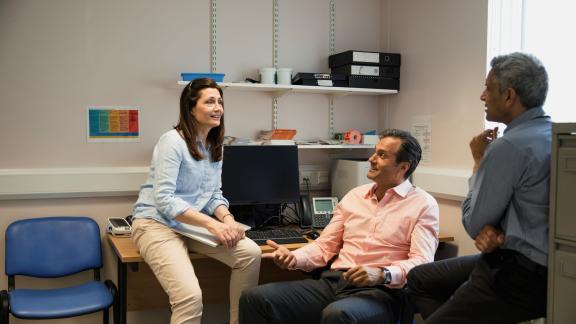Reflections on VC in the time of CV

Allan Wardhaugh, a paediatric intensivist and CCIO in Cardiff and Vale UHB, and a clinical lead for the National VC Proramme writes about the roll out of the NHS Wales Video Consulting Service
If you’d told me this time a year ago that the NHS in Wales would be doing around 3,000 video consultations (VC) per week across all health boards and trusts, in primary care and secondary care and introducing it to community pharmacies, optometrists and dental practices, I would have accused you of the kind of populist boosterism most of us are now allergic to. But here we are.
Eighty-five per cent of users (clinicians and patients) rate the service as good, very good, or excellent (the figure for patients alone is 93 per cent). Over 500 video consultations have now taken place in the out of hours GP services. Trials are already underway to enable care homes to use video consultations and with the assistance of Digital Communities Wales, over 500 care homes in Wales now have devices enabling VC with training for users increasing rapidly. Rather than recite the list statistics, a visit to the TEC Cymru website will show you what is happening.
I have been involved in the digital healthcare arena in Wales for almost five years now, and this implementation really has been astonishing. Circumstances are undoubtedly important – necessity being the mother of invention. It was not a difficult sell in the days of lockdown to encourage adoption of technology that would enable clinicians to deliver care (from their homes often) to patients in their own homes. But it has only been six months since the start. I pinch myself. To be blunt, a more expected experience would have been to have had months of wrangling over a ‘Once for Wales’ product, delayed funding decisions, never ending pilots…I won’t go on – I want to keep the positive tone this programme deserves. Here are some of my observations.
Firstly, an early decision was made to purchase a reasonably mature product: Attend Anywhere had been established in Australia and Scotland and so there was a degree of confidence. Having been in charge of a pilot in the Aneurin Bevan Health Board, TEC Cymru were trusted with the job of leading implementation and evaluation working in partnership with the Health Boards, Trusts, NWIS, Welsh Government and Digital Communities Wales. The italics are important – this has been a collaborative, enabling process not a directive one. Local teams have felt empowered to form their own locally informed, situation-appropriate rollouts with a strong clinically-led flavour. As with most technology introductions it’s less about the tech and much more about the people and allowing them to use the tech in the ways that can only be imagined by those at the coalface.
Secondly, there was a mature approach from Welsh Government colleagues. Listening to the clinical voices early on, it was agreed that it was the functionality that should be ‘Once for Wales’ and not necessarily the same product for all places at all times. A shared understanding has developed that we are just starting to learn about VC – where and when it works, where and when it doesn’t, what the cons are as well as the pros and what are those coal-face obvious use-cases that those at the centre would never be able to recognise. It is possible (perhaps likely) that one product will not cover all situations and that others should be considered for so-called edge cases. That said, if evaluation of a particular product is positive across all organisations, there will be no need to issue a ‘Once for Wales’ edict.
Third, building on that last point, this evaluation is using qualitative metrics not simply quantitative bottom-line analysis. There has been growing evidence for years that this is vital in ensuring that good tech is not ditched before it achieves a financial pay off (read about the ‘productivity paradox’ in Bob Wachter’s book The Digital Doctor). There has been an acceptance that this implementation is the start of a journey, and we cannot pre-determine the destination. Too often I have seen projects established as if they are car journeys that can be prescribed by a set of detailed instructions issued by a sat-nav when instead they are voyages at sea requiring a compass, a weather forecast and an ability to alter course as required by the elements. We don’t know what the ‘right’ number of VCs is as a proportion of all consultations – it is probably too early to set targets. It will not be right for all people all the time, and context will also be important (the state of the pandemic and lockdown restrictions).
So far so good. I think we have set out a template for rolling out tech at scale here. It is not all sweetness and light of course. The importance of respectful conversation and partnership cannot be understated, and it has been vital to the scale-up of VC to date. The outcomes are nuanced and not always easy to measure. The implementation fluid and adaptive. But that is a culture change. I am sad to say it has not always been my experience. Too often ‘command and control’ takes over – and that requires simplistic metrics and a ‘black and white’ rather than ‘shades of grey’ view of the world. I’m hoping the tide has turned on that way of thinking for digital health and care in Wales.
Allan Wardhaugh is a paediatric intensivist and CCIO in Cardiff and Vale University Health Board, and a clinical lead (secondary care) for the National VC Programme.



